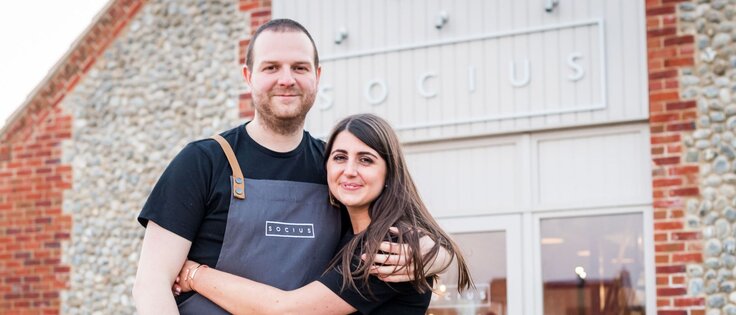
Article
7 min read
Scheduling shifts ahead turned Socius into an award winner
Alice Leach
May 1, 2024
What's on the menu
Meet the team
- Who: Natalie Lawrence
- Role: Co-owner and manager
- Business: Socius
- Where: Burnham Market, Norwich
That serves up
- Advice for learning from the past to a better future
- Reduced hours that increase happiness
- Ways to maximise your offering to help with recruitment
Who is Socius?
Socius is an award-winning restaurant in North Norfolk (named AA's Restaurant of the Year, 2022) that regularly makes national press and the Michelin Guide.
Owned by husband-and-wife team, Dan (head chef) and Natalie Lawrence (manager), the restaurant's been making waves for its great food served by an even greater team in its beautiful barn setting.
The pair launched the restaurant in early 2018 with covers for around 65.

Over the years, the duo has naturally grown their team, but the core staff is made made up of a solid and long-term group who grows with the restaurant.
The project is Nat and Dan’s love letter to the hospitality industry. They’ve taken their years of experience and created the kind of place they always wanted to work in. Putting mental health and work/life balance at the core of their business. The pair’s commitment to constantly improving not only the food and service, but the wellness of their team is paying off.
The challenge
Keeping together an expert team in a rural location
Burnham Market is a rural location. Attracting staff to the area, especially those with the expertise needed, and keeping them, is Socius’ biggest challenge.
“The biggest issue we’ve faced since opening is trying to get the level of skill we need into that restaurant. And it’s taken us up until very recently to achieve that”, Nat says.
Staffing issues left Dan and Nat having to fill in gaps, leaving the couple burnt out. This first-hand experience of what life without balance looks like has driven them to implement anything they can to avoid team burnout, and to make a sustainable and desirable workplace.
The Socius team has looked at numerous ways to attract – and keep – great staff. But Nat believes that their hours and scheduling have been key to the amazing team they have now.
Nat and Dan’s experience in the industry left them with a list of scheduling choices they wanted to avoid making themselves. Nat was clear about the importance of planned days off for the whole team. Many venues are open seven days a week, which means that when someone calls in sick, other team members have to step in and step up, often at the cost of their own days off.
The team also have yearly ‘team holidays’ where Nat and Dan close the restaurant completely. One break in January and one in May. It used to be January and November but feedback from the team called for a change – they found that two winter breaks left the staff with no short haul hot holiday options.
Nat and Dan’s listen, respond and implement staff-led suggestions and improvements to keep their team loyal and happy.
The solution
Planning ahead
Nat is certain that having a staffing plan is key to their happy and successful business. Planning gives the team a better work/life balance. And having complete down days and whole team holiday breaks prevents burnout and gives everyone that important time with loved ones, to enjoy hobbies and relax.
Nat: “Where we are now, as a business, we are the best we have ever been in terms of work/life balance. Even myself and Dan are noticing the benefits of that!”
Nat plans her FOH team’s rotas a month in advance – but gives them to her team two weeks before the new month begins. So, in reality, her team gets their work schedules six weeks in advance. Her team is made up of more part time staff, so a clear and forward planned rota is key to keeping staff happy and the team together.
For the kitchen, Dan makes the schedule 2 weeks at a time, on a permanent shift pattern. The only changes made to the schedule/pattern are for holidays and personal commitments. So there’s a real sense of routine, certainty, and consistency.
Everyone knows when they're working well in advance. So there's no worrying about what they might be taking home that month.

Clear schedules lead to clear improvements
And FOH have also seen scheduling pattern improvements, to help with that work/life balance. They get a Sunday off twice a month and two evenings off a month – their FOH members work less hours per person than the kitchen team, but Nat and Dan make sure they have important personal time off too.
They advertise these hours and schedules, along with relocation packages, to encourage the best talent.
Creating a new culture in hospitality
Nat and Dan know that they expect a lot from their team but make it clear that the team’s wellbeing is their main concern. This shows in their management style, and their active presence amongst the team.
“It is hard, and it’s not for everyone”, Nat tells us. But it’s their commitment to excellence in all areas of their business that shows in their long-term team retention and the restaurant’s accolades.
Natalie signs off with her top takeaways from planning further ahead
"We are constantly improving to make a sustainable lifestyle. Whatever we did yesterday is not good enough today. So we’re both looking for new ways to change things to make everyone’s life easier. We’re willing to invest to make life easier. We’re always trying to improve things.”

Want to make your staff as happy as Socius'?
If you liked that, you'll love this

How Planday helped DiningSix Group make The Single Biggest Shift
The DiningSix Group uses Planday to plan shifts ahead, control its ops and create a streamlined staff management plan. And it’s improving staff morale, too.

What is The Single Biggest Shift?
The Single Biggest Shift is the small change you could make that has a huge impact on your entire business. It’s planning rotas ahead. Here’s why it matters…
